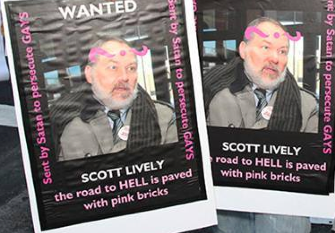 A Scathing Ruling, Court Affirms SMUG’s Charges Against U.S. Anti-Gay Extremist Scott Lively While Dismissing on Jurisdictional Ground – Historic Case Has Broken New Legal Ground, Documented Lively’s Campaign of Persecution in Uganda
A Scathing Ruling, Court Affirms SMUG’s Charges Against U.S. Anti-Gay Extremist Scott Lively While Dismissing on Jurisdictional Ground – Historic Case Has Broken New Legal Ground, Documented Lively’s Campaign of Persecution in Uganda
June 6, 2017, New York – Yesterday, a federal court minced no words in affirming that U.S.-based anti-gay extremist Scott Lively aided and abetted the crime against humanity of persecution in a ruling dismissing the lawsuit brought by Sexual Minorities Uganda (SMUG) on a narrow jurisdictional ground.
“Anyone reading this memorandum should make no mistake,” wrote Judge Michael Ponsor of the U.S. District Court in Springfield Massachusetts. “The question before the court is not whether Defendant’s actions in aiding and abetting efforts to demonize, intimidate, and injure LGBTI people in Uganda constitute violations of international law. They do.”
The judge ruled that even though the evidence supports SMUG’s claims that Lively worked to deprive them of fundamental rights, the court did not have jurisdiction as a result of a 2013 Supreme Court ruling issued after SMUG’s case was filed. The ruling in Kiobel v. Royal Dutch Shell limited the extraterritorial reach of the Alien Tort Statute, under which SMUG brought its claim. “The much narrower and more technical question posed by Defendant’s motion is whether the limited actions taken by Defendant on American soil in pursuit of his odious campaign are sufficient to give this court jurisdiction over Plaintiff’s claims,” Judge Ponsor continued. “Since they are not sufficient, summary judgment is appropriate for this, and only this, reason.”
“This case is a win for SMUG,” said Frank Mugisha, SMUG Executive Director. “The court’s ruling recognized the dangers resulting from the hatred that Scott Lively and other extremist Christians from the U.S. have exported to my country. By having a court recognize that persecution of LGBTI people amounts to a crime against humanity, we have already been able to hold Lively to account and reduce his dangerous influence in Uganda.”
In 2013 SMUG v. Lively broke new legal ground when the court rejected Lively’s motion to dismiss the case, finding that persecution on the basis of sexual orientation and gender identity is a crime against humanity and that the fundamental human rights of LGBTI people are protected under international law.
“The ruling clearly vindicates what SMUG and the LGBTI community in Uganda have known and said all along about Lively and his role in Uganda,” said CCR Senior Staff Attorney Pamela Spees. “They have shown incredible courage, dignity, and determination in the face of rising repression and persecution. No matter what happens next in this case, they have made an important difference in demanding their day in court, achieving the recognition that persecution of LGBTI people is a crime against humanity, and facing down one of their key persecutors armed only with the truth of their experience and moral courage.”
Given the widespread claim that homosexuality is foreign to Africa and a corrupt Western import, the documentation of the Western role in orchestrating the persecution of LGBTI people has proven an embarrassment for Lively’s Ugandan partners.
“The court recognized that Lively worked to erase LGBTI Ugandans from civil and political life – a threat to Ugandan self-determination,” said Rutgers Law professor and Center for Constitutional Rights co-counsel Jeena Shah. “The evidence surfaced in this case showed how Lively’s persecutory efforts exploited a long history of Western homophobia in Uganda, beginning with British colonization.”
The court emphasized throughout the decision the illegality and harm of Lively’s campaign of persecution, finding that:
- “Defendant Scott Lively is an American citizen who has aided and abetted a vicious and frightening campaign of repression against LGBTI persons in Uganda.”
- “[Lively’s] crackpot bigotry could be brushed aside as pathetic, except for the terrible harm it can cause. The record in this case demonstrates that Defendant has worked with elements in Uganda who share some of his views to try to repress freedom of expression by LGBTI people in Uganda, deprive them of the protection of the law, and render their very existence illegal.”
- The evidence “confirmed the nature of Defendant’s, on the one hand, vicious and, on the other hand, ludicrously extreme animus against LGBTI people and his determination to assist in persecuting them wherever they are, including Uganda. The evidence of record demonstrates that Defendant aided and abetted efforts (1) to restrict freedom of expression by members of the LBGTI community in Uganda, (2) to suppress their civil rights, and (3) to make the very existence of LGBTI people in Uganda a crime.”
Read today’s ruling here. This press release is online here. To learn more, visit CCR’s case page.
Sexual Minorities Uganda is represented by Center for Constitutional Rights and Jeena Shah of the International Human Rights Clinic at Rutgers Law School in Newark, the law firm of Dorsey & Whitney, LLP, Christopher Betke, Luke Ryan, and Judith Chomsky.
Can they not take it to a European court?
I do believe there may have been better routes. Though I am not making my opinion about this action and result public yet. I have pretty much posted the CCCR spin on the result through posting their press release. I am sure Scott Lively will post his spin on his BLOG soon! Jurisdiction and Nexus to outcomes of persecution are major challenges.